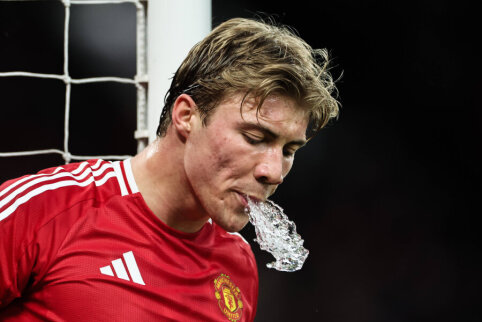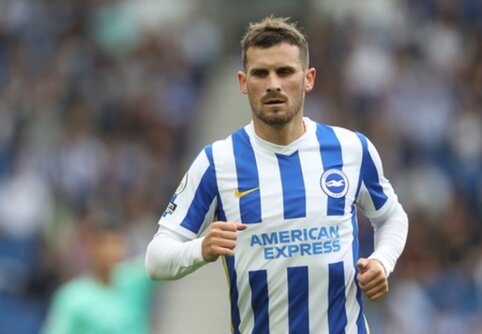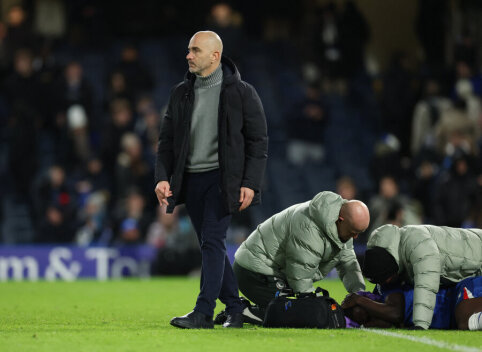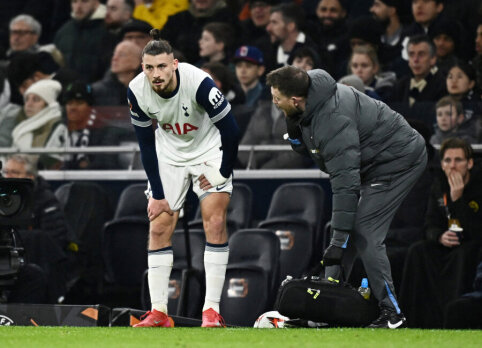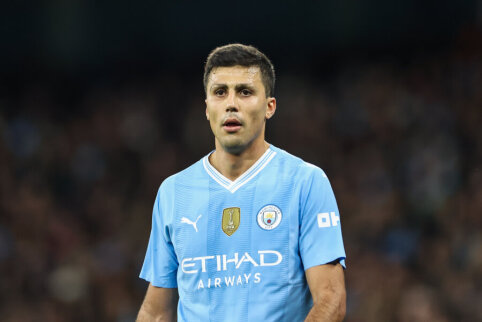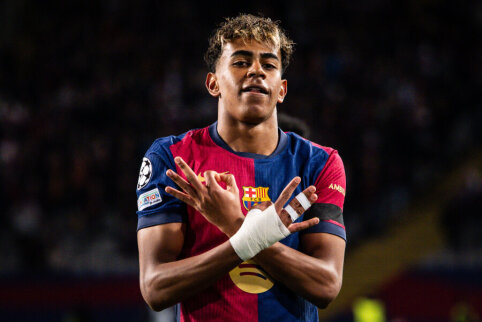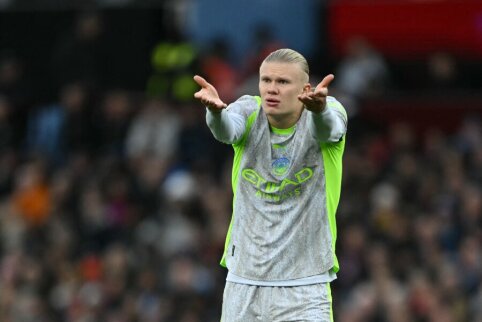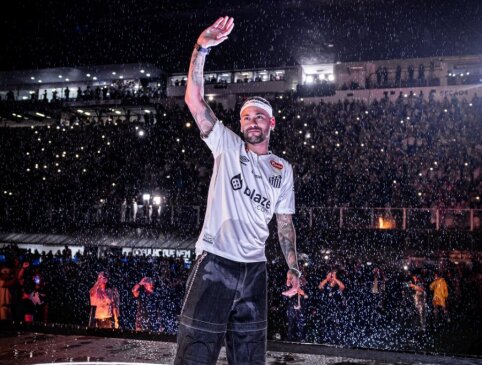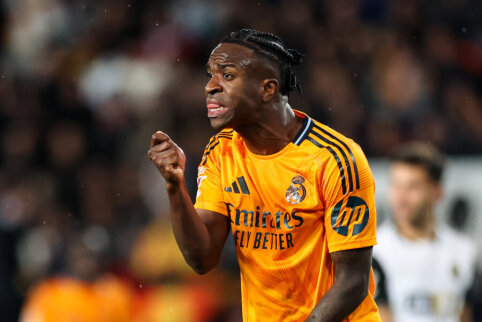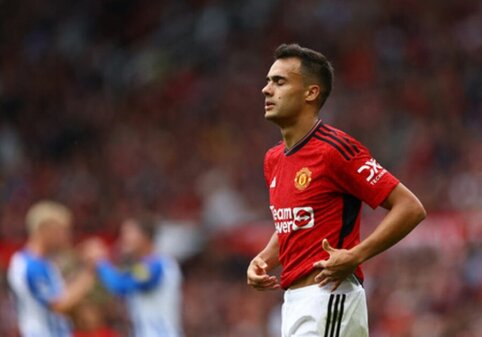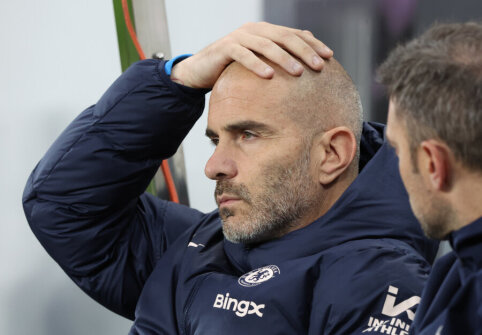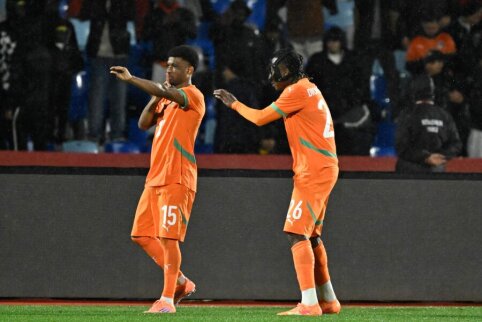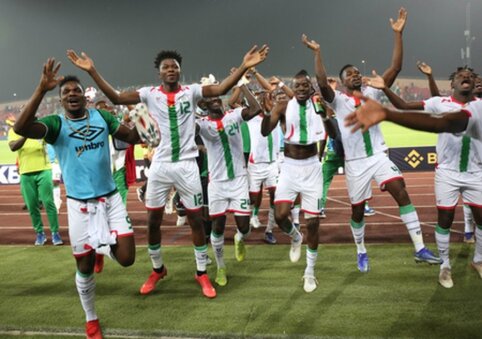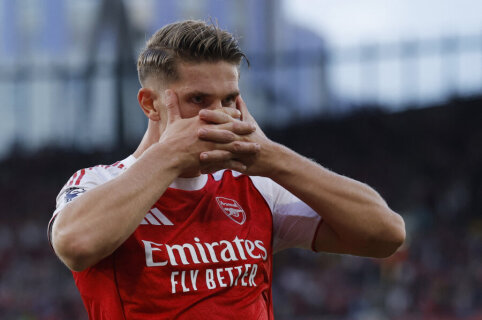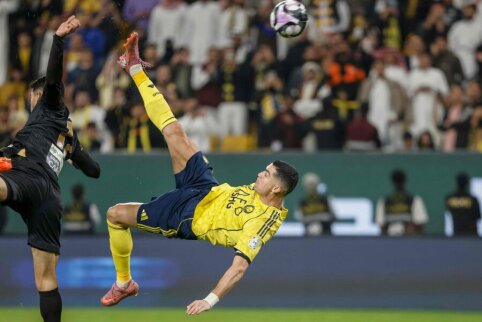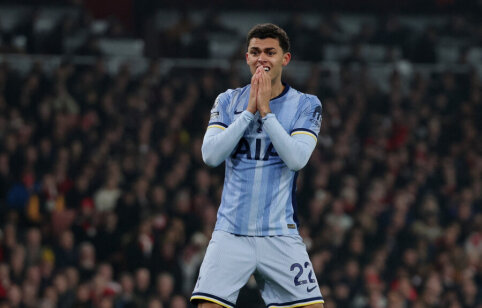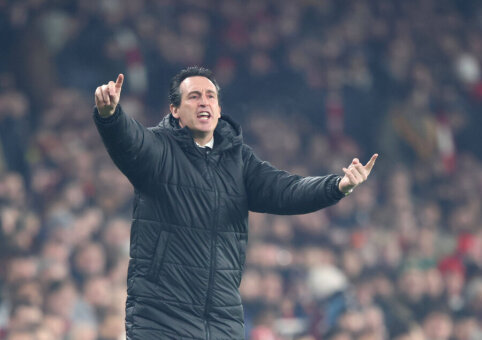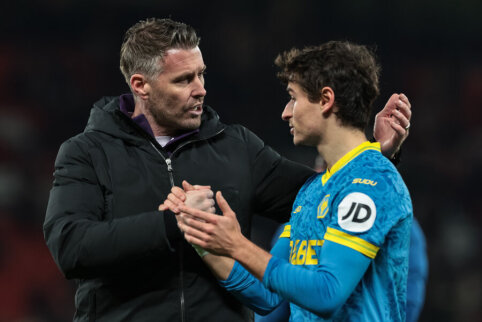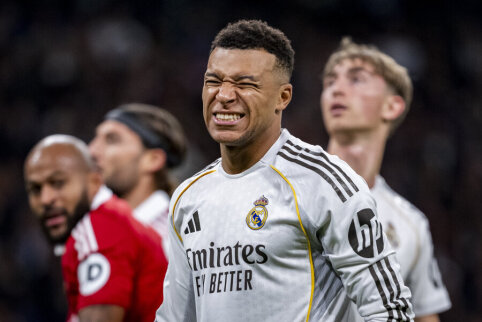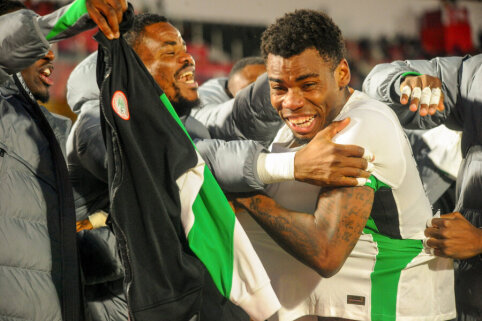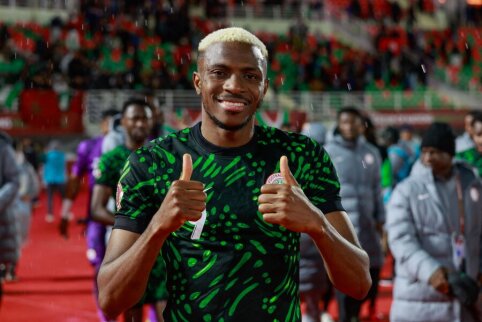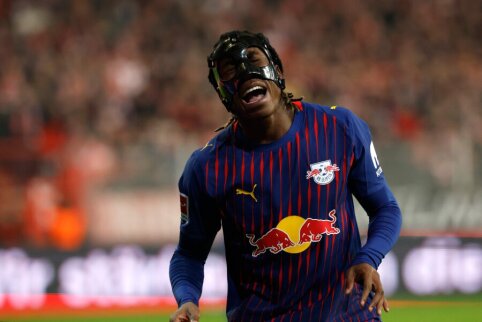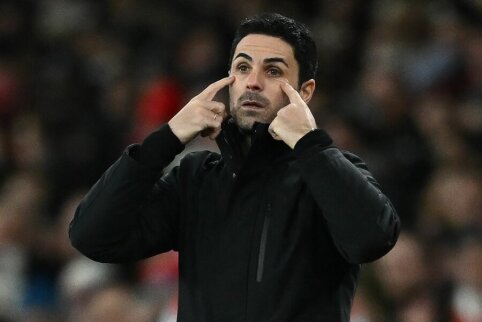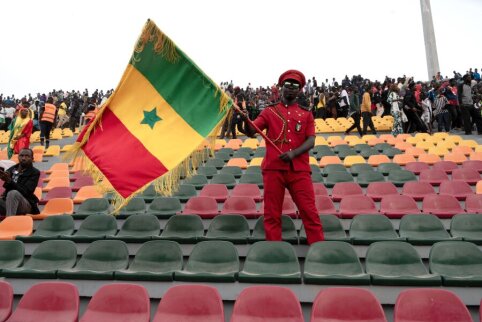 © EuroFootball.com
© EuroFootball.com
Throughout the past week, EuroFootball.com visitors had the opportunity to submit questions to football club strategist Vytas Jančiauskas. Here we present to you this exclusive interview with the respected coach.
Tell us about your career. When did you start your coaching career? What was your first club? What prompted you to choose a coaching career?
I started my coaching career a long time ago. In 1977, after graduating from the Physical Education Institute, I received an appointment to "Žalgiris". Due to family circumstances, I turned down a player's career and started working at the Republican Children and Youth Sports School, where I began coaching and organizing. I had to select Lithuanian national teams because at that time large Spartakiad games were held on a Union-wide scale, and the Lithuanian government and sports authorities set very high demands for students. I was responsible for matches and football.
As for my coaching work, I directly faced it in 1979 - I needed to take care of the family area provided by Vilnius Construction and Repair Trust and started coaching children. It was not a professional job, it was for children's leisure activities, to keep them from wandering the streets.
I started working professionally as the head coach of the Soviet Football Union national teams for Lithuania. This was a Moscow assignment, and I was responsible for selecting candidates for various age group Soviet national teams. The workload was huge, but I didn't directly do that job - I traveled around Lithuania, observed the candidates' play, supervised work in camps, more like a scout. This work gave me a lot of additional knowledge compared to what I gained at the Institute, as it was theory combined with practice. At that time in Lithuania, they did not work with children as thoroughly as in the Soviet Union, which relied on the latest knowledge and set clear goals.
Later, I formed a team "SRT" in Vilnius, which became champions, prize winners, and won a cup. It was my creation, and I played there myself for a while. In 1985, I became an assistant to B.Zelkevičius in Vilnius "Žalgiris". Since I had a good theoretical and practical basis and had played myself, it wasn't difficult to switch to coaching. Also, I knew the youth well.
In 1992, when B.Zelkevičius went to work in Austria, he left me to coach the main team. We then invited young players to the team, who are now finishing their careers: D.Maciulevičius, A.Skarbalius, E.Poderis, D.Vencevičius, A.Pukelevičius. We took all of them from Vilnius boarding school, assembled a very good team, played the second round excellently, and became Lithuanian champions. At that time, our team also had E.Jankauskas, who was then sixteen, T.Žvirgždauskas, also sixteen. Both of these players played in the main team, and T.Žvirgždauskas played defense for the entire second round! And D.Vencevičius, D.Maciulevičius, and E.Poderis, although they were eighteen-year-olds, also played in the starting lineup. With such a young team, we became Lithuanian champions. Of course, later there were characters from Kaunas who tore apart the team with which we could achieve a lot.
After that season, I let the team rest for ten days and then we went to a camp in Austria. There we played against the then Austrian champions "Memphis", which included Ivanauskas, Narbekovas, and Frydrichas, and we beat them 3-2. Away, we beat a team that included players from the Austrian national team! Well, they underestimated us.
Later, we also participated in the "Dallas Cup" tournament in the USA, where we lost to Bolivia in the semi-finals after penalty shootouts. As far as I know, several Lithuanian teams traveled after us, but did not achieve the same results as us.
In 1997, I left "Žalgiris", having previously worked as the club's general director, and in 1998, I joined Vilnius Pedagogical University, where I worked as a lecturer and also trained the university team.
In 2001, Rūdiškės "Vetros" president R.Stašauskas invited me to become a coach. After getting to know the team, which had dropped to a lower league at the time, I said that with this lineup, we should fight for the championship title. They may have thought I was arrogant, but I proved my words. In the next season, by breaking all records, we won the I League and entered the "A League", and in the LFF Cup, we even reached the semi-finals. The goal for the following season was to qualify for a European competition. In the following season, LFF behaved poorly - if you remember, before the final in Telšiai, after a penalty shootout, we succumbed to Klaipėda's "Atlantas". Before these matches, LFF claimed that we had already earned the right to play in Europe, so the players relaxed a bit, but later it turned out that only the winner of the cup earns this right. Later, in August, I left the team, but they managed to take third place, which was a kind of result of my work because during the season, a new coach who came couldn't change much.
Is it difficult to part ways with VPU? Do you ever plan to return there? What do you think of the current VPU coach?
Working with students was very interesting because most of them who joined the team had not completed a sports school. No one may believe it, but we worked with them after ten training sessions per week, and we succeeded - we became student champions twice, last year we took second place in the Helsinki Games, and two years ago, we became runners-up again in the tournament in Tartu, Estonia, losing only in the final to the Donetsk University team. The students achieved a lot, and it was very interesting to work with them, and it is difficult to leave.
The current VPU team coach Volodya Buzmakov I know well, as he was my student. I can only speak positively about him: he was diligent, disciplined, a player who never caused any problems. He wasn't a star, but he had achieved a high level.
How do you deepen your knowledge, enhance your qualifications, and prepare for matches?
As a lecturer, my job forces me to be interested in news, new training methods. I easily read in German, can communicate easily, so I have a lot of information in that language. There are definitely many interesting thoughts and suggestions, new methodologies. Unfortunately, we don't have the necessary training base, lack of equipment, lack of quality fields.
I have videos, I constantly update my knowledge, because I have friends in Germany who send me materials.
Immediately after matches, we start preparing for the next match. Upon returning home, I find out the opponents' results, check the lineup. The gap between matches is very important. For example, we played on Wednesday before the weekend match, while "Sūduva" played on Tuesday, so they had one extra day of rest. This is very important when matches are played every three days.
After analyzing the opponents, you start building a strategy. The strategy depends on whether you're playing at home or away, how many goals the opponents have scored or conceded, you gather information about the team and then, depending on whether there are any losses in the team, you model the game.
Do you follow the work of foreign coaches? Which coach's work do you admire?
Through television, I follow the championships of England, Germany, and Spain. Modern technologies provide many opportunities to watch European football. I have always admired Beskov, I mean the style of play of "Spartak". Speaking of Lobanovsky, he promoted a different style of football, but also raised many excellent footballers, and there is certainly a lot to learn from them.
Among Western European coaches, I have recently been very impressed by former "Bayern" Munich coach Ottmar Hitzfeld, former "Kaiserslautern" and Greece national team coach Otto Rehhagel. I have my own opinion about F.Rijkaard - in my eyes, he fell after spitting at an opponent during a match. And "Barcelona" plays well not because they have a good coach, but because they have fabulous players. Such a team doesn't even need a coach; they just need a good organizer. It's difficult to evaluate the "Real" coach because it's a show team where no one wants to defend, run, or fight, because everyone just wants to play with the ball. Now, with the addition of new players to the team, they have covered up certain gaps, which is the work they've done behind the scenes.
I have always admired "Man Utd" coach Sir Alex Ferguson. I don't know what he's like as a person, but the team he leads has its own style, and almost all of Man Utd's victories are associated with his name.
After playing four rounds in the "A League", do the goals for "Šiauliai" remain the same? Before the season, you said that the team's goal is to finish fifth in the "A League".
No, by no means. Everyone knows that we play away in the first round, and I think earning four points in four matches is quite satisfactory. We certainly shouldn't have lost the match in Marijampolė, and it hurts when you concede a goal in the 92nd minute. We know we have our own problems. Perhaps we don't have enough substitutes on the bench, so we have problems when changing players (in the last two matches, both main team strikers were unable to help the team due to injuries - ed. note). However, the team's fighting spirit, the desire to achieve something, sometimes determines more than skill.
In your opinion, how long does it take to elevate the "Šiauliai" to the second place in the "A League"?
The question is very much like "what if." With a good budget, you can fight for first place, but you need a large budget. Next year, we can set the pace in the "A League," gather high-level players not from Lithuania, but currently I think we are building the team from scratch in Šiauliai. With the current resources, we are doing a lot. We work hard, some players even wonder why they have to work eight hours: not just training, but also participating in reviews, analyzing opponents. A footballer is also a professional worker, and his workday should last eight hours.
Instead of Amar Atigbiolaye, who rarely appears on the field, would you like to let young Šiauliai players play?
We compared Amar to his peers in Šiauliai - Amar was probably two heads taller. I would like to let Šiauliai players play, but they simply don't exist. Amar is only eighteen, but sometimes I can't let him play because of a language barrier, not because he plays poorly, but because of a language barrier. In addition, he needs to adapt to Lithuanian football because football in Africa is really different. He played in the starting lineup in Marijampolė, and he fought really well, had one great opportunity, and it's a shame he didn't manage to capitalize on it. We are pleased with his performance.
What are the team's strengths and weaknesses? What would you like to improve?
It is very difficult to name the strengths because the players are of different levels: some have more experience in the "A League," others are less experienced. I believe that team spirit, cooperation between players, and the desire to help each other to be the team's strengths. The shortcoming is that many players have missed the moment when they needed to improve a particular technical action, gain more tactical knowledge. I think we need to extract that from the players as soon as possible.
What do you think about corruption? Does it really prevail in Lithuanian football?
Corruption prevails not only in Lithuanian football. It exists in Italian, French football, and generally - in World football. It would be incorrect to say it is there, but from what I see as a specialist in European championships, even World championships, it makes you think so. However, this is not just about football, it applies to other sports as well.
How do you assess the situation of Lithuanian football? What, in your opinion, is missing in Lithuanian football in general and in Šiauliai specifically? What should be done to make football in Lithuania as popular as in Western Europe?
The roots run deep. If you remember, in 1989, football was as popular as basketball. It was unclear which sport was more popular. Stadiums were full. At that time, nearly 25 thousand boys were attending football training. By comparison, today only about eight thousand do. At that time, almost half of the districts had either football schools or football groups in sports schools, there were two high-performance schools. They were systematically and purposefully prepared to play professionally. The very noticeable work with children is certainly the sports schools: sometimes we had to take the entire year's group, sometimes just one or two players the next year, sometimes not even one. The work starts from childhood.
Currently, no one works with children. Why are we surprised that Lithuanian U-17, U-19, or U-21 national teams are losing? Our youth constantly won prizes in the tournaments organized by the Soviet Union. Everyone was surprised how such a small country could achieve such results. However, systematic and targeted work was done with youth at that time.
I think the first thing is paying attention to children, second - bases, bases, and bases. The bases have not changed since I played 25 years ago: they are still as bad. How long will we wait to improve the bases? I understand that at that time we were a provincial Moscow, but now that we are FIFA and UEFA members, we can participate in various programs, receive funds for training, and improve facilities. However, the problem is not only with the federation, the problem is also with the government: everything pivots around basketball. No one would have thought that one day Lithuania would have a modern 10-thousand-seater basketball arena. But we don't have a decent stadium that would dignify our country, raise our image. Our stadiums are morally outdated.
Football should be included in the school physical education programs, just like basketball. Perhaps the federation also puts in little effort, but it's difficult for me to say because I am a bit detached from those organizational matters. Everything is possible, but we need to work, we need to put in the effort. The government must understand that we are an EU member, and in all EU countries, football is supported, it is popular. Look at the people who sit in the stands in those countries.
What event do you consider the most memorable in Lithuanian football history?
Undoubtedly, it is the restoration of UEFA and FIFA membership. This is the main and most memorable event in Lithuanian football history.
How do you assess the performance of the Lithuanian national football team in the 2006 World Cup qualification cycle in Germany?
I believe the team has not yet reached its potential, so I can only give a positive assessment of their performance.
Who do you consider among the best players currently playing in Lithuania?
It is difficult to say at the moment since the players have not reached a good sports form. I cannot say for sure at the moment.
Which national team, besides Lithuania, and which foreign player do you like the most?
I have always been a big fan of the Brazilian national team. As for players, I really admire Ronaldinho. He is not only a top-class player but also an entertainer who can play in a spectacular way and captivate the audience. I can also mention David Beckham, who may play a bit wavy. Also, "Chelsea" forward Didier Drogba, Andre Shevchenko, who has been demonstrating consistent high-level play for several seasons.
Who do you consider the best goalkeeper currently? Do you have a dream in football? What is it?
I consider Petr Cech the best goalkeeper at the moment. I noticed him during the European Championship. Second, maybe as a goalkeeper with good field vision and high technique, Gianluigi Buffon.
Would you like to coach the Lithuanian national football team?
There is a saying: "A bad soldier is one who doesn't want to become a general." What coach wouldn't want to coach their national team? Everyone does.
Do you have a dream in football? What is it?
The dream is that the team would succeed, that it would reach such a level of play that it delights the spectators, that they return to the stadiums, that the audience goes to the stadiums to see Jonaitis, Petraitis, have their own stars. That the team not only participates in European competitions but plays, fights, glorifies Lithuania, its city in Europe and the World.
What would you wish EuroFootball.com visitors and football fans?
It must be acknowledged that the efforts made by the federation produce results: the condition of stadiums has improved, the appearance of the stands has improved, and the teams have started to play differently, the level has grown. That pleases me. I would like to wish patience in order to raise the level of Lithuanian football. That everyone together strives for the good of Lithuanian football. I would wish for real football, not scripted, because the spectators can feel it, they want to see a battle on the field, even though it is not at the level of famous clubs. We can take Scandinavia or Austria as an example - there isn't a high level of football there either, but spectators never lack in the stadiums because there is more sincerity, dedication, a desire to achieve a result. I wish spectators and visitors patience and faith in Lithuanian football. It will surely return.
